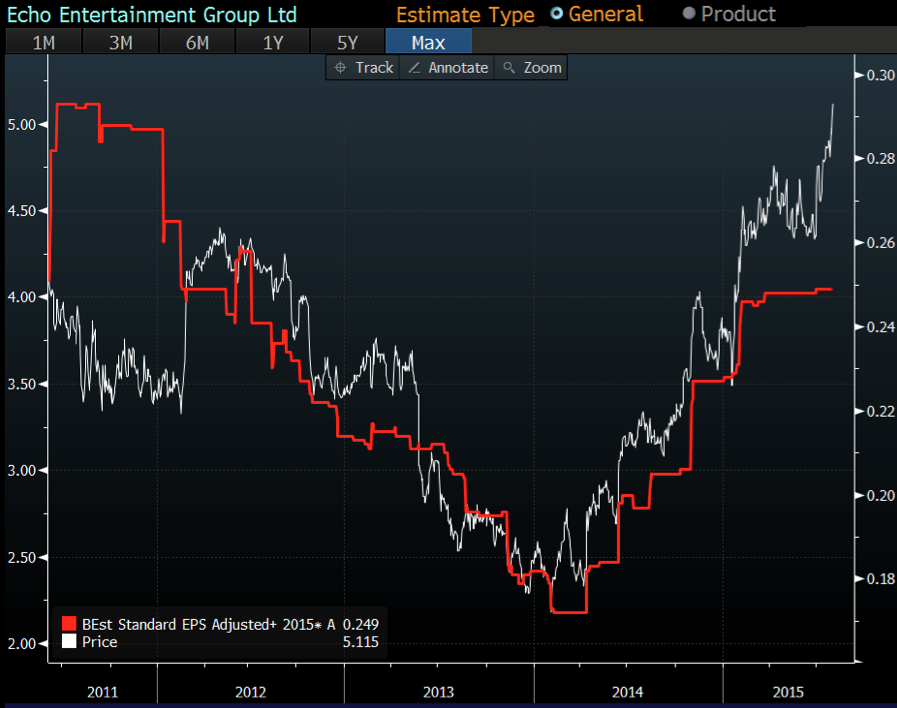
Is something going right at Echo?
There are some good reasons to be concerned about the Australian economy at the moment. With commodity prices taking a nosedive and the Chinese stock market falling sharply, our nation’s strategic positioning of being highly dependent on China is looking less-than-ideal for the years ahead.
There will inevitably be some bright spots, however, in an otherwise bleak landscape, one example being Echo Entertainment (ASX: EGP). The chart below shows the Echo Entertainment share price and consensus expectations for the Financial Year 2015 EPS (Earnings Per Share). You can see that after falling relentlessly for a number of years, things turned around in 2014 and have been consistently cheery ever since.
Prior to 2014, Echo Entertainment had been a somewhat troubled business, with a series of high profile departures including the sacking of The Star’s manager, Sid Vaikunta in 2012, chairman John Story resigning later in the year following a stoush with James Packer, followed by CEO Larry Mullin departing the same year.
Larry Mullin was succeeded briefly by John Redmond, and then in early 2014 Matt Bekier was appointed CEO. Things seem to have been on a steady trend of improvement since then.
Some improvement may well have occurred regardless of the CEO, due to changes already in train, and events outside management’s control (in Macau for example). However, at least part of the turnaround in fortunes appears to relate to Bekier’s efforts. Broking analysts saw a good first half 2015 result as confirmation of management’s domestic gaming strategy, and sell-side analysts are now contemplating continued strong growth for some years to come, with Queen’s Wharf the latest in a series of positive developments.
Picking management turnarounds are not really part of our style, and Echo Entertainment is a success story we haven’t participated in, but we’re happy to give credit where it’s due.
Well played.
Tim Kelley is Montgomery’s Head of Research and the Portfolio Manager of The Montgomery Fund. To invest with Montgomery domestically and globally, find out more.

Sam writes: SAM: Roger,
There’s an old sports quote that “you’re never as good as they tell you when you win and you’re never as bad as they tell you when you lose.” Echo was caught in a perfect storm of a lag in earnings after massive capex in Sydney, long term under investment in Queensland by a former ownership structure and an angry scorned billionaire who commenced a very sophisticated public campaign to discredit Echo to end their monopoly right to operate in Sydney.
This negative public narrative led the market to price the business for destruction. Helped by a management change, a billionaire getting what he wanted, a Chinese Government forcing whales offshore and a Queensland Government disallowing any public pressure in the Queens Wharf process thus allowing some patient and calm planning, this entirely changed their conduct, public perception and outcomes at the company.
All of which have encouraged a rerating of the equity value of the company.
Kudos to those patient enough and perceptive enough to look past the noise and movement and examine the facts on this one.
And Dan writes: Follow the big money: KT Lim was buying in at half today’s prices, a little over a year ago.